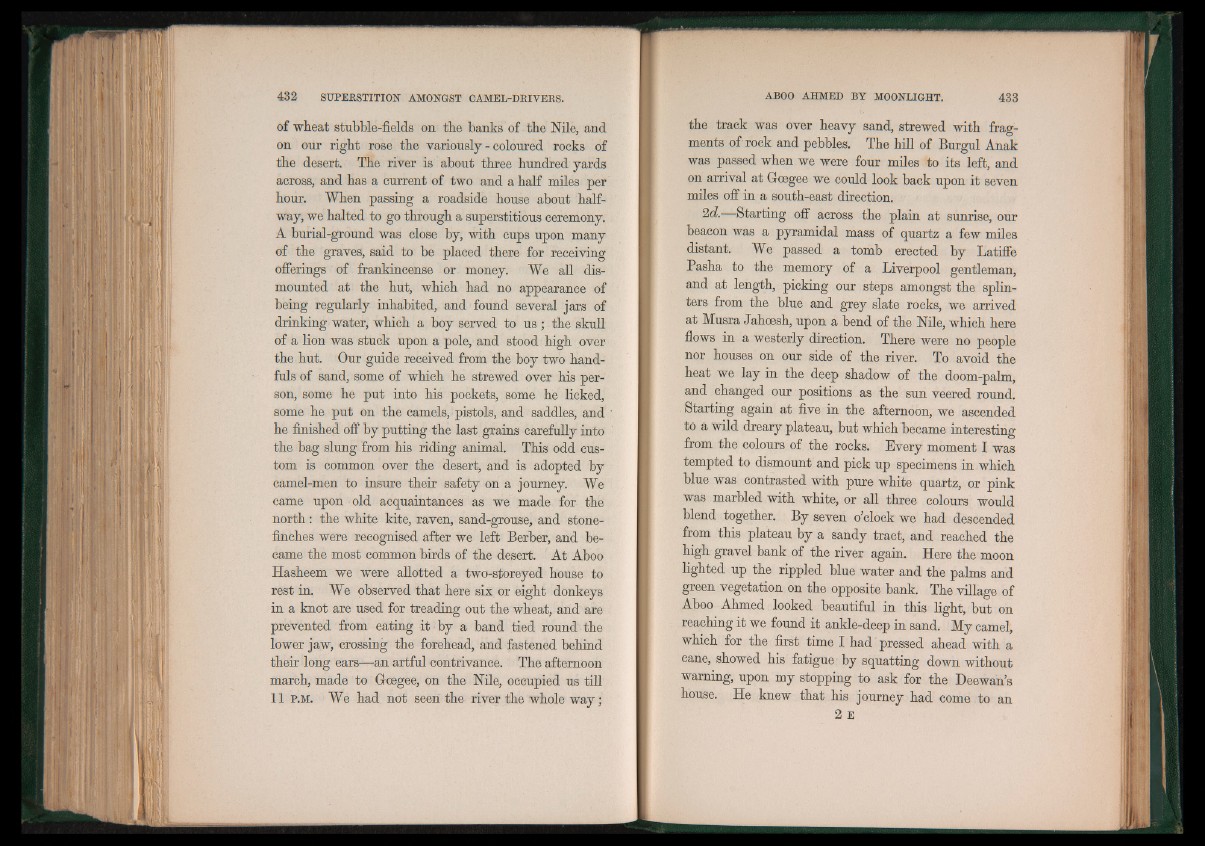
of wheat stubble-fields on the banks of the Nile, and
on our right rose the variously - coloured rocks of
the desert. The river is about three hundred yards
across, and has a current of two and a half miles per
hour. When passing a roadside house about halfway,
we halted to go through a superstitious ceremony.
A burial-ground was close by, with cups upon many
of the graves, said to be placed there for receiving
offerings of frankincense or money. We all dismounted
at the hut, which had no appearance of
being regularly inhabited, and found several jars of
drinking water, which a boy served to us ; the skull
of a lion was stuck upon a pole, and stood high over
the hut. Our guide received from the boy two handfuls
of sand, some of which he strewed over his person,
some he put into his pockets, some he licked,
some he put on the camels, pistols, and saddles, and
he finished off by putting the last grains carefully into
the bag slung from his riding animal. This odd custom
is common over the desert, and is adopted by
camel-men to insure their safety on a journey. We
came upon old acquaintances as we made for the
north: the white kite, raven, sand-grouse, and stone-
finches were recognised after we left Berber, and became
the most common birds of the desert. At Aboo
Hasheem we were allotted a two-storeyed house to
rest in. We observed that here six or eight donkeys
in a knot are used for treading out the wheat, and are
prevented from eating it by a band tied round the
lower jaw, crossing the forehead, and fastened behind
their long ears—an artful contrivance. The afternoon
march, made to Goegee, on the Nile, occupied us till
11 p .m . We had not seen the river the whole way;
the track was over heavy sand, strewed with fragments
of rock and pebbles. The hill of Burgul A n a k
was passed when we were four miles to its left, and
on arrival at Goegee we could look back upon it seven
miles off in a south-east direction.
2d. Starting off across the plain at sunrise, our
beacon was a pyramidal mass of quartz a few miles
distant. We passed a tomb erected by Latiffe
Pasha to the memory of a Liverpool gentleman,
and at length, picking our steps amongst the splinters
from the blue and grey slate rocks, we arrived
at Musra Jahoesh, upon a bend of the Nile, which here
flows in a westerly direction. There were no people
nor houses on our side of the river. To avoid the
heat we lay in the deep shadow of the doom-palm,
and changed our positions as the sun veered round.
Starting again at five in the afternoon, we ascended
to a wild dreary plateau, but which became interesting
from the colours of the rocks. Every moment I was
tempted to dismount and pick up specimens in which
blue was contrasted with pure white quartz, or pink
was marbled with white, or all three colours would
blend together. By seven o’clock we had descended
from this plateau by a sandy tract, and reached the
high gravel bank of the river again. Here the moon
lighted up the rippled blue water and the palms and
green vegetation on the opposite bank. The village of
Aboo Ahmed looked beautiful in this light, but on
reaching it we found it ankle-deep in sand. My camel,
which for the first time I had pressed ahead with a
cane, showed his fatigue by squatting down without
warning, upon my stopping to ask for the Deewan’s
house. He knew that his journey had come to an
2 E